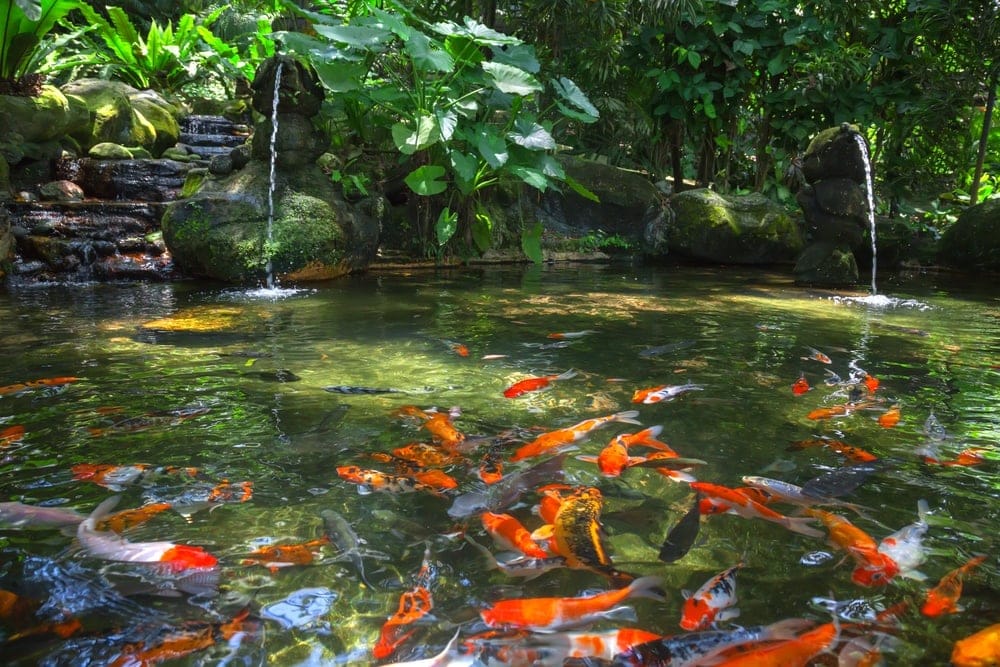You need to clean and maintain your pond. Now, some people prefer not to have filters in their outdoor fish ponds, mainly because of the cost and because outdoor filters can run into some big problems depending on the weather and climate.
Yes, it is possible to have a fish pond without a filtration unit, but you will need to find other ways to clean it effectively. After all, just because you do not have a filter does not mean that waste will not build up.
Without a filter, fish waste, rotting plants, uneaten food, ammonia, nitrates, and a list of other contaminants can and will pollute the water. All of these will hurt and kill your fish and plants. We’ll examine how to keep pond water clean without a filter.

The 10 Methods to Keep Pond Water Clean Without Filter
1. Don’t Overstock The Pond
One of the first things to keep in mind when you are not using a filter is to not overstock the pond. By this, we mean that you should not add too many fish to the pond. Fish eat a lot, and they produce a lot of fish waste.
The waste is an eyesore. It mucks up the water and releases poisonous compounds like ammonia too. The fewer fish in the pond, the less waste is produced, and the less of these compounds will be present in the water.
The amount of water in the pond compared to the number of fish, when not using a filter, needs to be much higher than when you use a filter.
Since there is no real way to filter contaminants out without a good filtration unit, keeping the fish population fairly low is necessary.
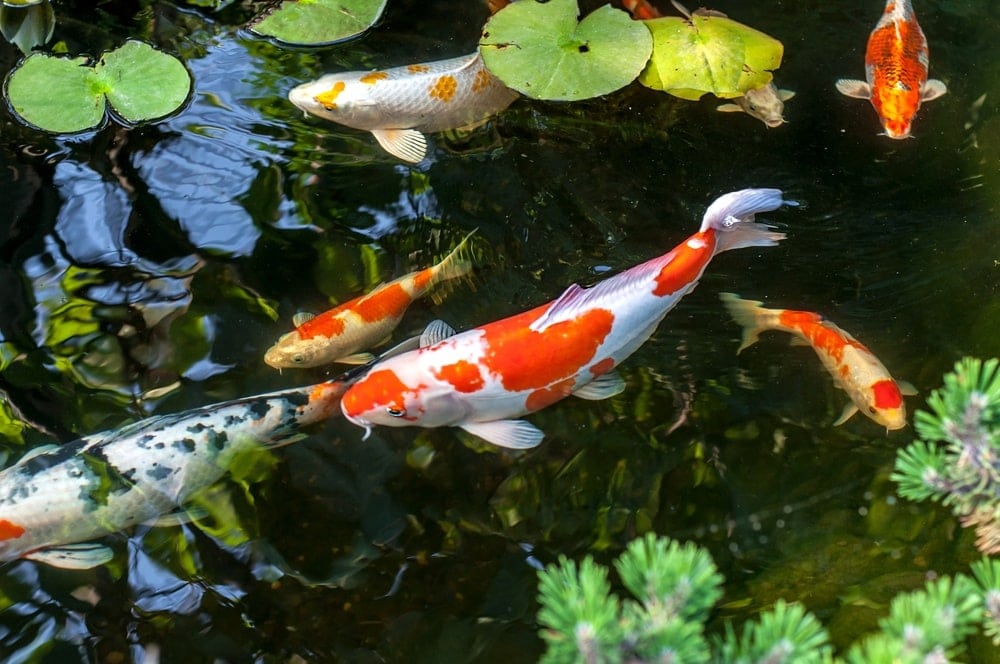
2. Don’t Overfeed Your Fish
The next thing that you want to keep in mind is that you don’t want to overfeed the fish. If you overfeed your fish, there will be a lot of uneaten food in the water. The uneaten food releases ammonia, nitrates, nitrites, plus some other substances too.
These chemicals are harmful to fish, and they can cause algae blooms. This is also true for the fish waste itself. The more you feed the fish, the more waste will be produced.
Try to feed your pond fish just enough to survive, or a little more, but don’t spoil them with tons of food and treats that they won’t eat or will eat too much of. It also helps to have the right kinds of foods, such as ones that do not contain phosphates.
3. Engage In Regular Water Changes
One of the best ways to help clean pond water without using a filter is to frequently change the water. You can safely change up to 30% of the total water volume in the pond without negatively affecting the fish or plants. Removing the old water is really effective because you are directly removing contaminants and debris from the water.
Just be sure to dechlorinate the water and treat it so that it is suitable for your pond fish before adding the new water into the tank. Chlorine is very harmful to fish, and you need to be sure that the new water you are adding to the pond contains absolutely none of it.
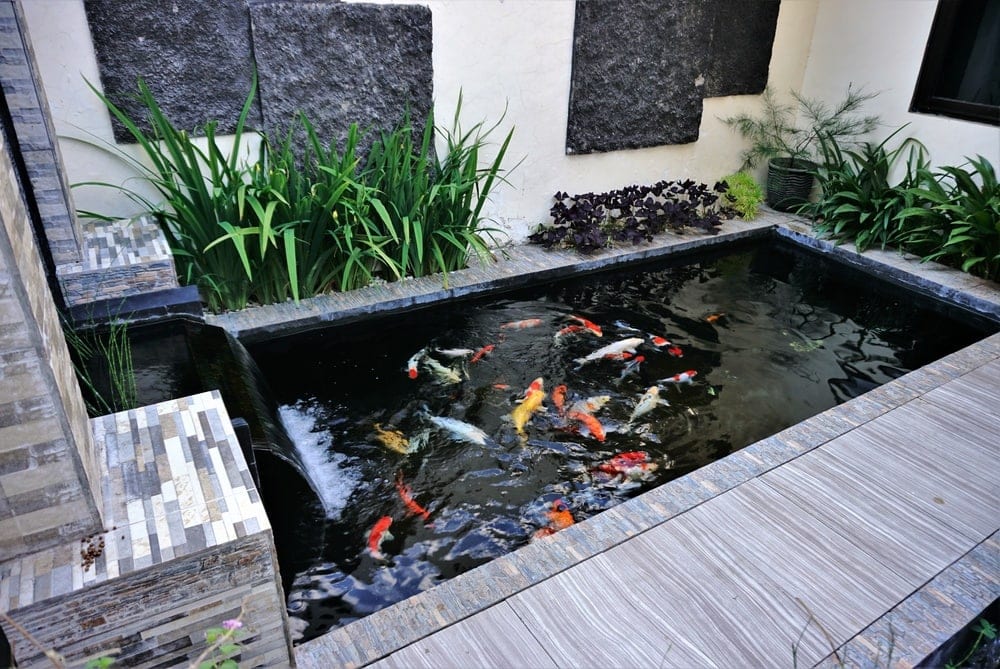
4. Clean Your Pond Regularly
The next way to keep your pond water clean without using a filter is to clean it manually. Now, the most important aspect here is to clean away all solid fish waste, algae, uneaten food, rotting plants, and dead fish.
All of these materials decay and release harmful substances like ammonia into the water. Since you don’t have a filter, these things will just build up.
A great way to keep the water clean is to remove the substances as soon as they’re visible. Also, you probably want to remove decorations, plants, and ornaments from the water now and again to clean them as well. The cleaner you keep the pond, the less need there is for a filtration unit.
5. Use A UV Sterilizer
A UV sterilizer can benefit your filter-less pond. If you don’t have a good mechanical, biological, and chemical filtration unit, various substances which algae feed off will build up, thus causing algae blooms.
However, algae need sunlight to bloom and multiply, so using a UV sterilizer to neutralize the sunlight will go a long way in keeping the pond water free of algae. Algae suffocate plants and fish, and it smells bad too.
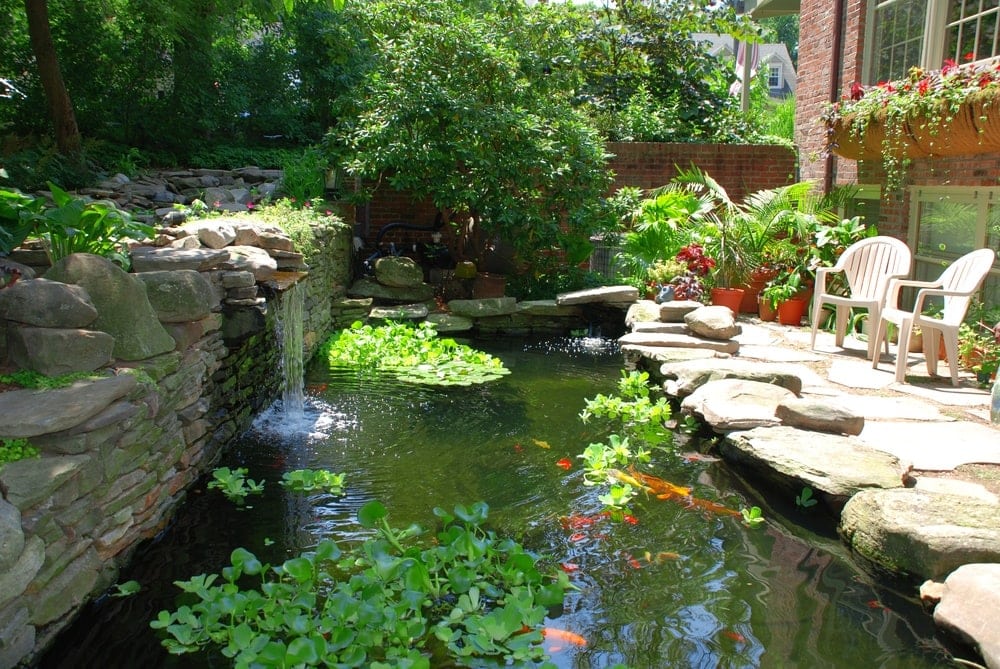
6. Use A Nano Media Reactor
A nano-media reactor is like a backup filtration unit that specializes in the removal of organic compounds like nitrates and ammonia from the water.
Yes, in a way, it is a filter. A nano-media reactor is a great thing to have if you have several fish that produce a lot of waste. It is also an effective tool in terms of algae control as well. We have reviewed our top 5 here.
7. Use Pond Dye
Using pond dye is not exactly the best way to keep your pond water clean, but it does come with one main benefit: algae control. Since algae need sunlight to thrive, blocking out as much light as possible will help control the algae growth (we have reviewed our top pond dyes over in this article).
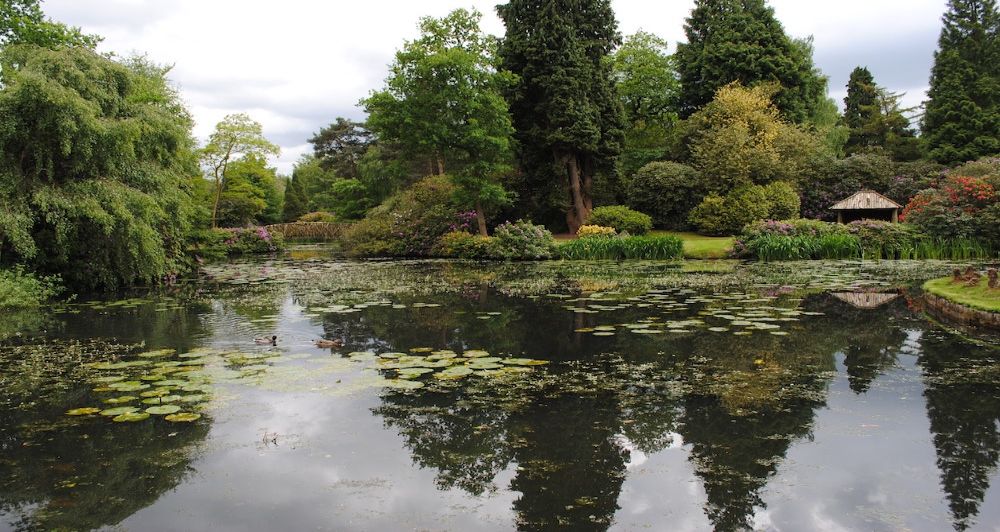
8. Have The Right Plants
Having the right plants in your pond is beneficial for keeping it clean. Submerged plants act as natural filters, and they help to draw out poisonous substances from the water.
Having a good number of submerged plants in your pond will help absorb waste products created by the fish. At the same time, having floating plants will help stop sunlight from making it to the water, thus also controlling algae growth (we have covered our 10 favorite plant options here that help to keep the water clean).
9. Take Advantage Of Cover
Sure, having your pond under a tree may cause leaves to fall into it, but that is not a huge deal in the long run. Having your pond under a tree will help to block out sunlight, thus controlling algae growth.
However, if you have a tree where birds make their homes, you might want to avoid this since bird waste is full of ammonia, and you definitely do not want them to defecate in your pond (we have covered some tips here on keeping birds away from your pond).
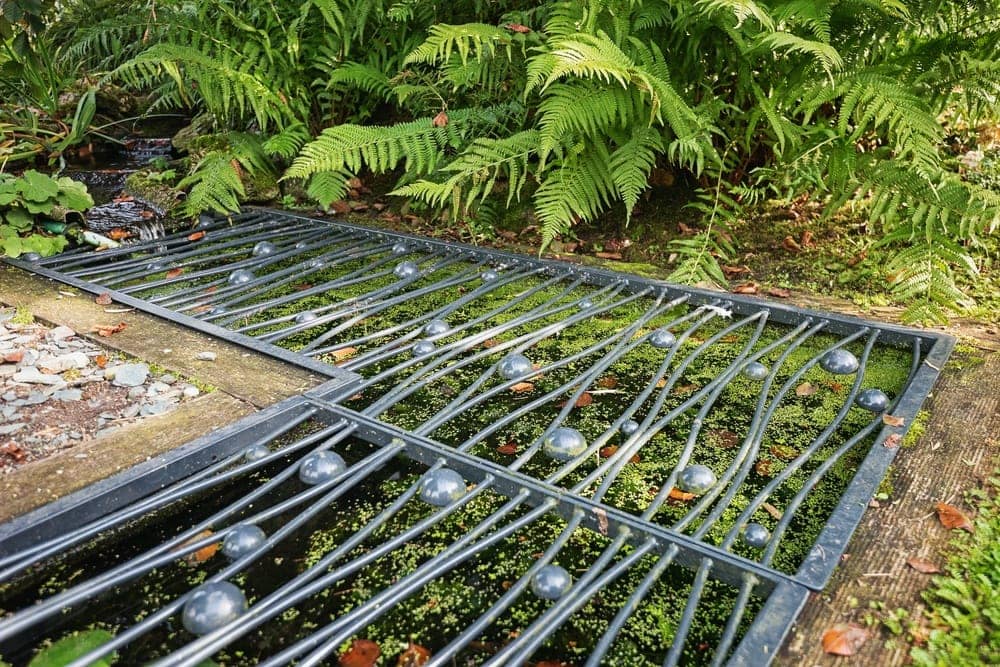
10. Use Special Additives
The final technique is to add special additives to the pond, mainly beneficial bacteria. Beneficial bacteria will work to break down ammonia and nitrates, thus reducing the need for biological filtration.
It is actually one of the best ways to keep your pond water clean if you do not have a filter and do not plan on getting one.

FAQs
Do I Need A Filter For My Pond?
You might be wondering, “do ponds need filters?”. It is beneficial to have a filter in your pond since it is the best way to keep it clean, keep the levels of ammonia and nitrates down, and ensure that the pond has properly oxygenated water. However, there are ways of maintaining a healthy pond without the use of a filter, although it is a bit harder.
If you have a fairly large pond with only a few fish in it, the bioload may be light enough that you can do without a filter. Moreover, live plants are helpful because they will provide some water filtration and oxygen to the pond.
Furthermore, ensuring that you do not overfeed your fish helps so they don’t create as much waste, and having a cleanup crew, such as snails, will go a long way in removing excessive algae, waste, and food remnants.
You can also add some beneficial bacteria to the water on occasion, which will help control ammonia and nitrates. So, while it is much easier and very beneficial to have a pond filter, it is not always 100% necessary.
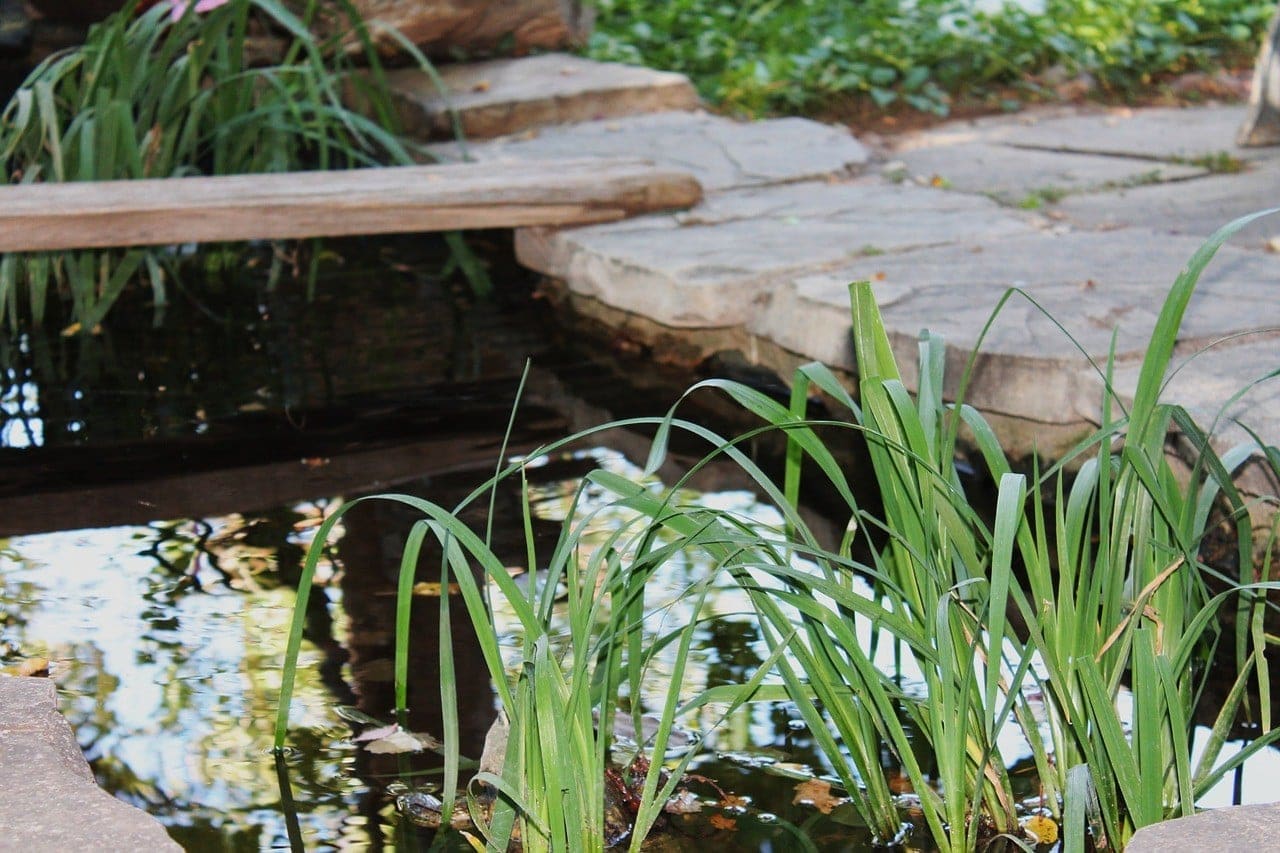
How To Make A Pond Filter Without Electricity?
To be quite honest, making your own pond filter is a challenge, both in terms of constructing and maintaining it. When you add a lack of electricity to the mix, things get even harder.
One thing you could do is get a pond filter and hook it up to a solar system to provide it with power. Yes, it still uses electricity, but you aren’t plugged into a power outlet. One of the best ways to filter pond water without electricity is to use natural pond filters.
A good layer of substrate at the bottom, such as a combination of gravel and sand, will allow waste and rotting plant matter to move downwards, but the best way is to use natural pond filter plants.
There are a few great plants out there that filter pond water. However, the bottom line is that unless you are a diehard pond enthusiast and you have a ton of technical knowledge, you probably won’t construct your own filtration system.
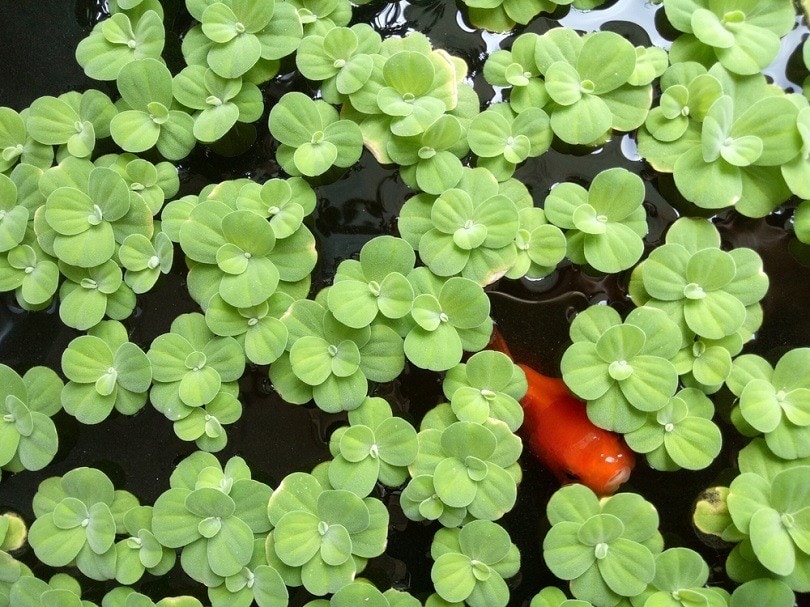
Can Goldfish Survive In A Pond Without A Pump?
A Pond without filters and pumps is hard to maintain. However, goldfish may be able to survive in pond water without a pump, but there are various factors to consider and various steps you will need to take if you want to make it work.
- If you have a lot of fish in the pond compared to the amount of water, you might need a pump and filter to provide enough oxygen for them to survive.
- This is related to the overall bio load in the pond. The more plants there are in comparison to the amount of fish, the more filtration and oxygenation you will require.
- Generally speaking, fish can survive in a well-maintained pond for quite a while without a pump and filter, but when it comes down to it, sooner or later, you will run into big problems. It’s best to have a pump.
How To Get Crystal Clear Koi Pond Water?
Let’s go over some quick tips on how to maintain clear koi pond water.
- Never overcrowd the pond with too many koi fish. The more fish there are, the more waste they produce, which then requires cleaning and maintenance.
- Do not overfeed the koi fish.
- Use beneficial pond plants to filter out the water.
- Have a reliable filtration system that can easily handle several times the amount of water in the pond per hour, preferably one that engages in all 3 major types of filtration to clear out as much waste and as many unwanted substances as possible.
- You can always add some beneficial bacteria to the mix since it will help increase the nitrogen cycle, break down waste, and eliminate poisonous substances such as nitrates and ammonia.
- Having a few snails in the pond never hurts either.
How To Clean Pond Water With Fish In It?
If your pond is really dirty, you may have to remove the fish from it before you clean the pond water, but this is not always necessary.
Let’s go over a quick step-by-step process on how to clean pond water with fish in it.
- Step One: Use a pond cleaning net to skin the pond water surface and remove as much floating debris as you can.
- Step Two: Remove the pump, filter, and decorations from the pond, so you can wash and clean them separately.
- Step Three: Use a pond net or a special pond vacuum to carefully clean the bottom of the pond of any debris that should not be there, being careful to work around the fish.
- Step Four: If there is an overgrowth of algae, you can use a toilet brush or something similar to remove excessive amounts of algae.
- Step Five: Clean the pond filter, the pump, and any decorations. Then, slowly return them to the pond, making sure not to disturb the fish.
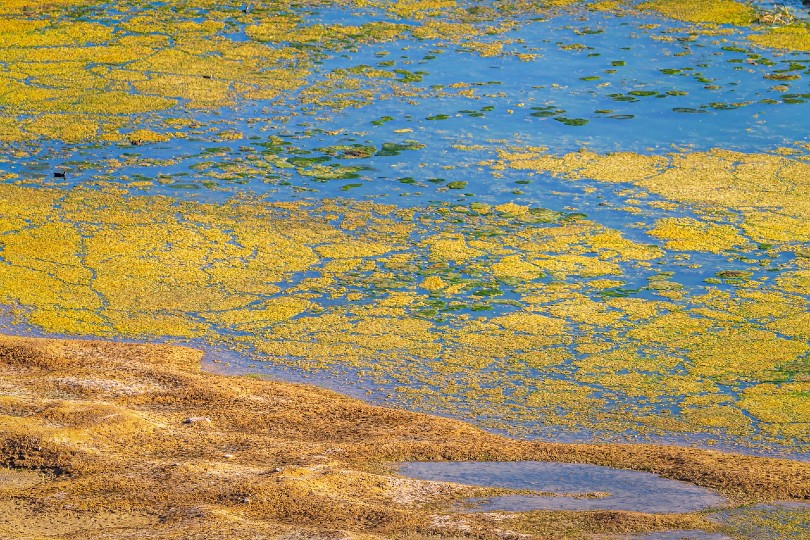

Conclusion
As you can see, you do not need a filtration unit for your pond. Having a filter is definitely better than not having one, but if you implement our suggestions, you should not have any problems keeping your pond water clean. Sure, it might be easier to keep a pond clean with a filter, but it is totally doable without one. However, you have to be diligent about maintenance if you have a filterless pond.
You Might Also Be Interested In:
- 8 Best Pond Heaters & De-icers
- 6 Best Pond Fountains for Small & Large Ponds
- Is It Possible To Keep Guppies In A Pond?
- What Does A Bio Pellet Reactor Do? Do You Need One?
Featured Image Credit: Zhukova Valentyna, Shutterstock
